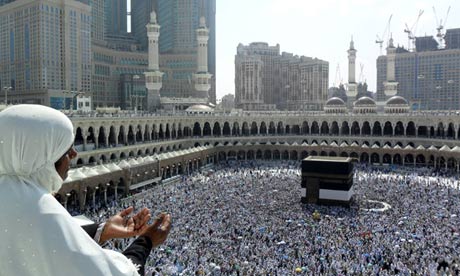G4S's work in Saudi Arabia has sparked controversy. But where is the outcry over human rights as a new Mecca rises to service pilgrims?

Cranes and skyscrapers tower over Hajjis in Mecca. Photograph: Alaa Badarneh/EPA
News that the Saudi government has engaged the services of security firm G4S for this year's hajj is angering campaigners, who accuse the company of profiting from the Israeli occupation of Palestinian land.
G4S has not revealed details about the nature or the scale of its involvement during hajj although a 2011 publication mentions a contract with Jeddah Metro to assist with security during that year's pilgrimage.
In light of the accusations about its activities in Israel, the company told a website that although it operates there, the structure and management of its work in Saudi Arabia is entirely different. A G4S spokesman also told Middle East Monitor: "Whilst we don't provide security directly for the pilgrims, we do provide security support for clients in Saudi that will require additional support during the hajj period."
Regardless of the nature or scale of the security firm's involvement in the pilgrimage, the combination of sacred sites and occupied territories is an inflammatory one and one NGO is already calling on the Saudi ambassador to the UK for the government to immediately end its contracts with G4S.
But if Muslims feel aggrieved about human rights abuses and hajj, then perhaps they ought to take a look at what is happening under the shadow of the heavy machinery surrounding Mecca, for the skyscrapers and shopping malls of Islam's holiest city are not being built by pixies.
This week, the Guardian highlighted the abuse and exploitation of migrant workers who are preparing Qatar for the World Cup in 2022. Similar scrutiny should also be applied to the projects under way in the holy cities of Mecca and Medina, although these have traditionally tended to excite more indignation over the demolition of buildings with historic and religious significance than the erosion of rights of the workers razing mountains. It is a good thing there is more awareness about Islam's heritage and the need to preserve it. A natural extension of this activism and discussion are questions about the people shaping Mecca: who are they, and what are their living and working conditions like?
Given the problems in accessing Saudi Arabia at the best of times, let alone during hajj, it is difficult to establish how many workers are involved with the Mecca projects, where they come from, how they are treated and how closely construction firms obey the country's labour laws. Saudi laws outline the responsibilities that employers have to protect their workers against occupational hazards, industrial accidents and workplace injuries as well as dealing with the employment of non-Saudis. Human Rights Watch has documented themistreatment of migrant workers and it is clear that existing employment legislation is no bar to abuse. Construction workers in Saudi Arabia face many of the same problems with working conditions, lack of mobility, lack of redress as other workers based in the Gulf. As in Qatar, Saudi Arabia operates a kafala system, which requires all unskilled labourers to have a sponsor. Migrant workers are therefore unable to enter the country, leave it or change jobs without their company's permission. In the spirit of openness the Saudi government could list the names of companies involved in the building projects and these companies could in turn make a pledge to uphold the rights of workers in a way that not only adheres to national legislation but also the spirit of hajj.
It may be that the very purpose of hajj makes it difficult for some to focus on the issues that the modern day pilgrimage raises. It reconnects Muslims with the religion's prophets; it represents purity, renewal, a reminder of the hereafter, unity, submission to Allah, piety, collective worship and humility. But hajj is also about equality, fraternity and justice.
While nobody is expecting banners to be unfurled in the courtyard of the Grand Mosque – although it would certainly liven up the annual television coverage – there is nothing to stop Muslims from at least asking deeper, difficult questions about the human cost of hajj.
